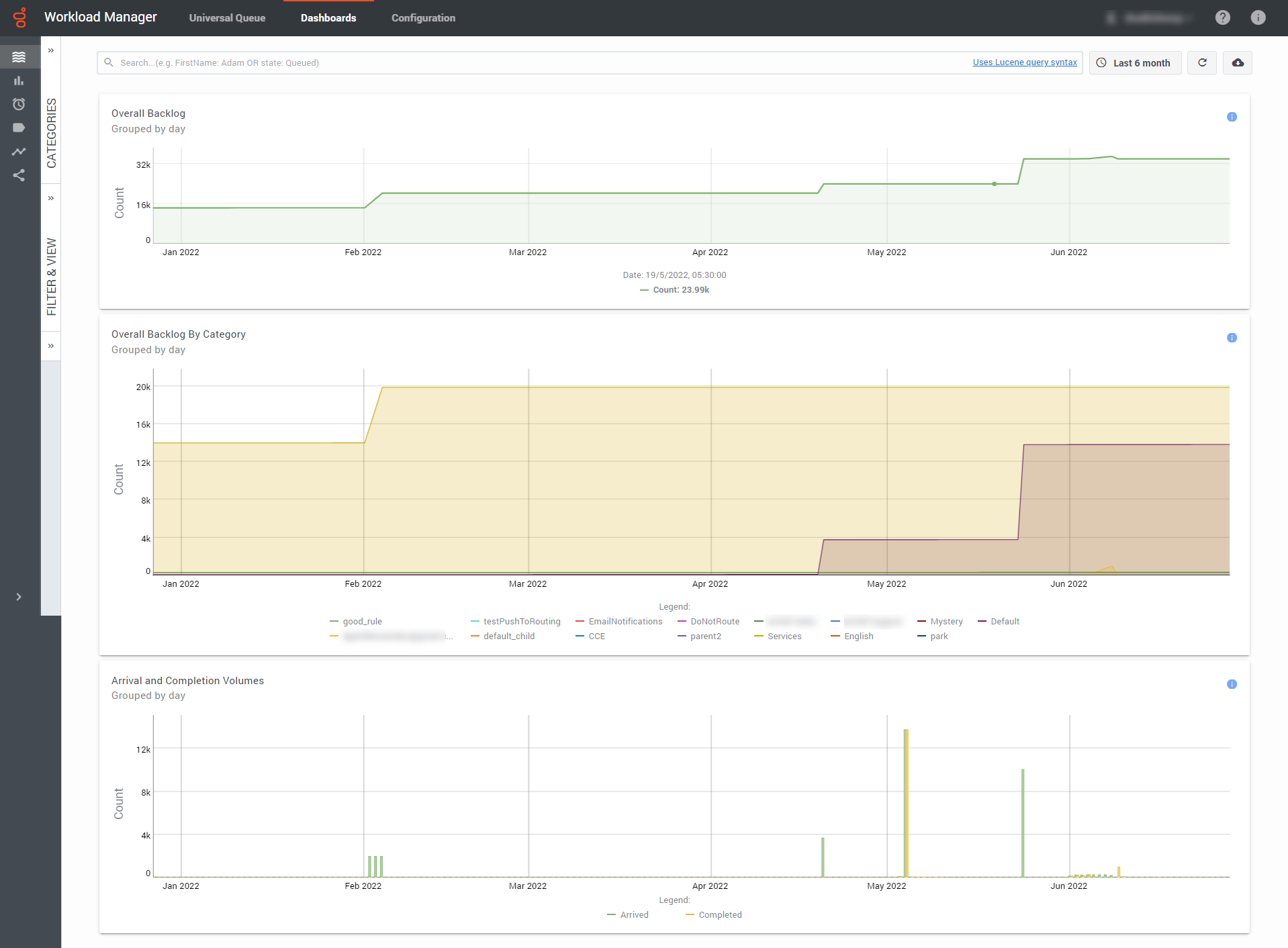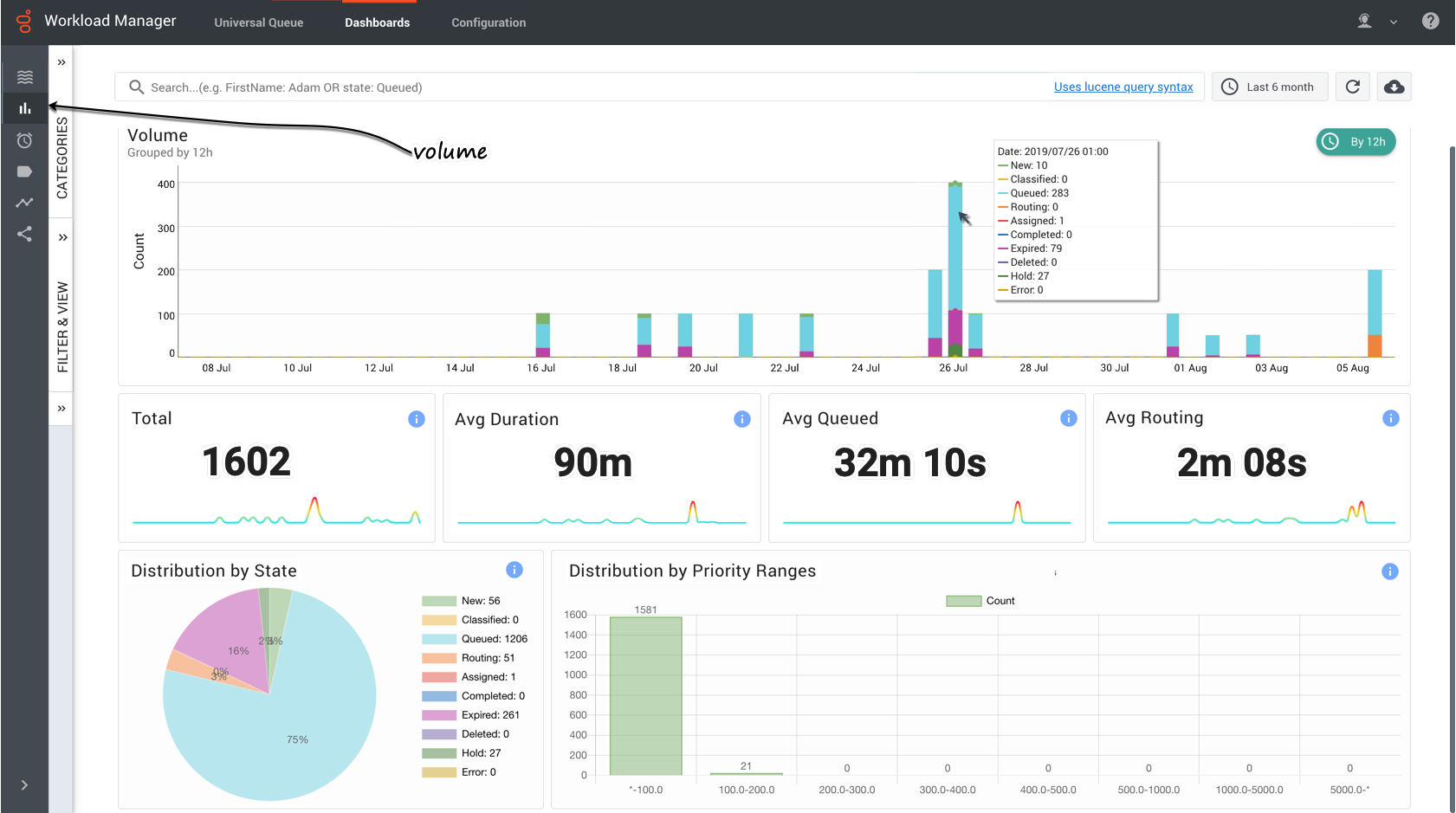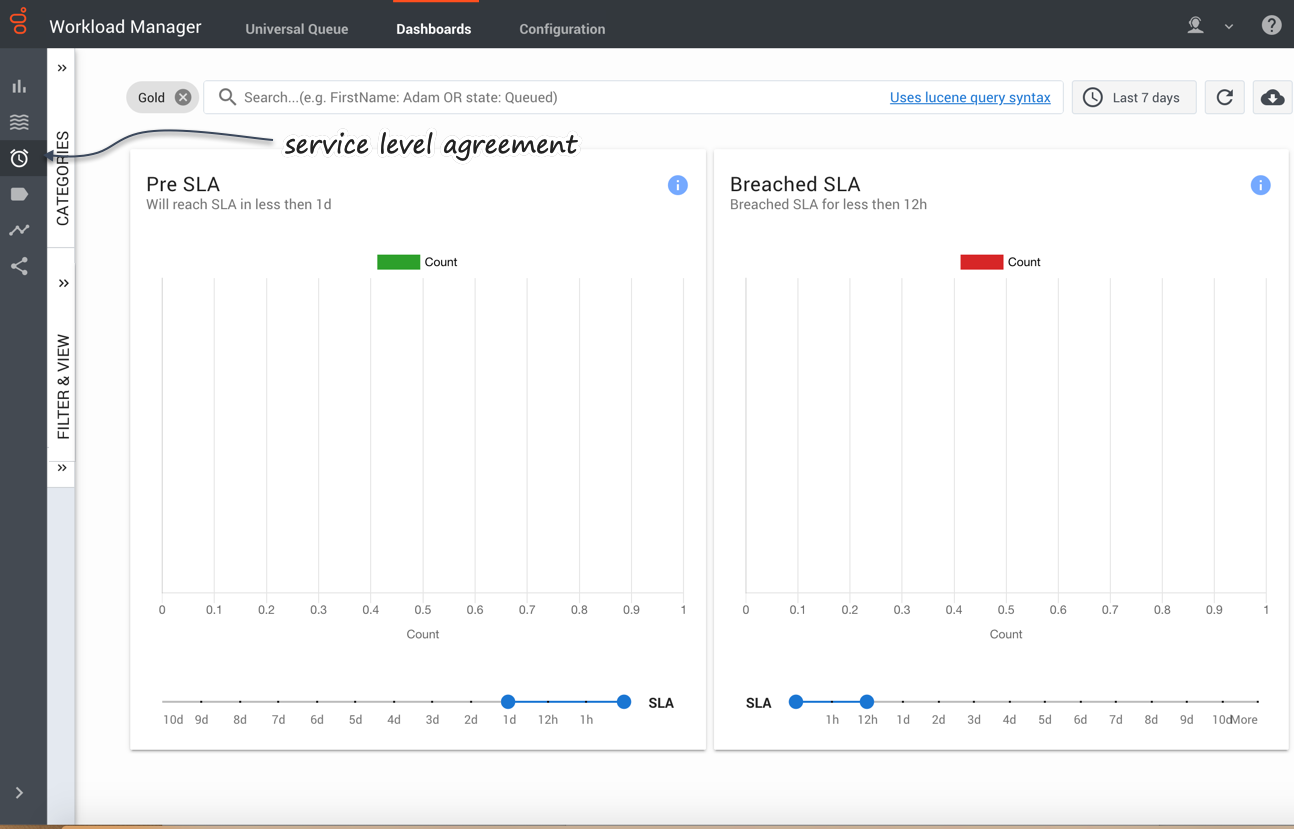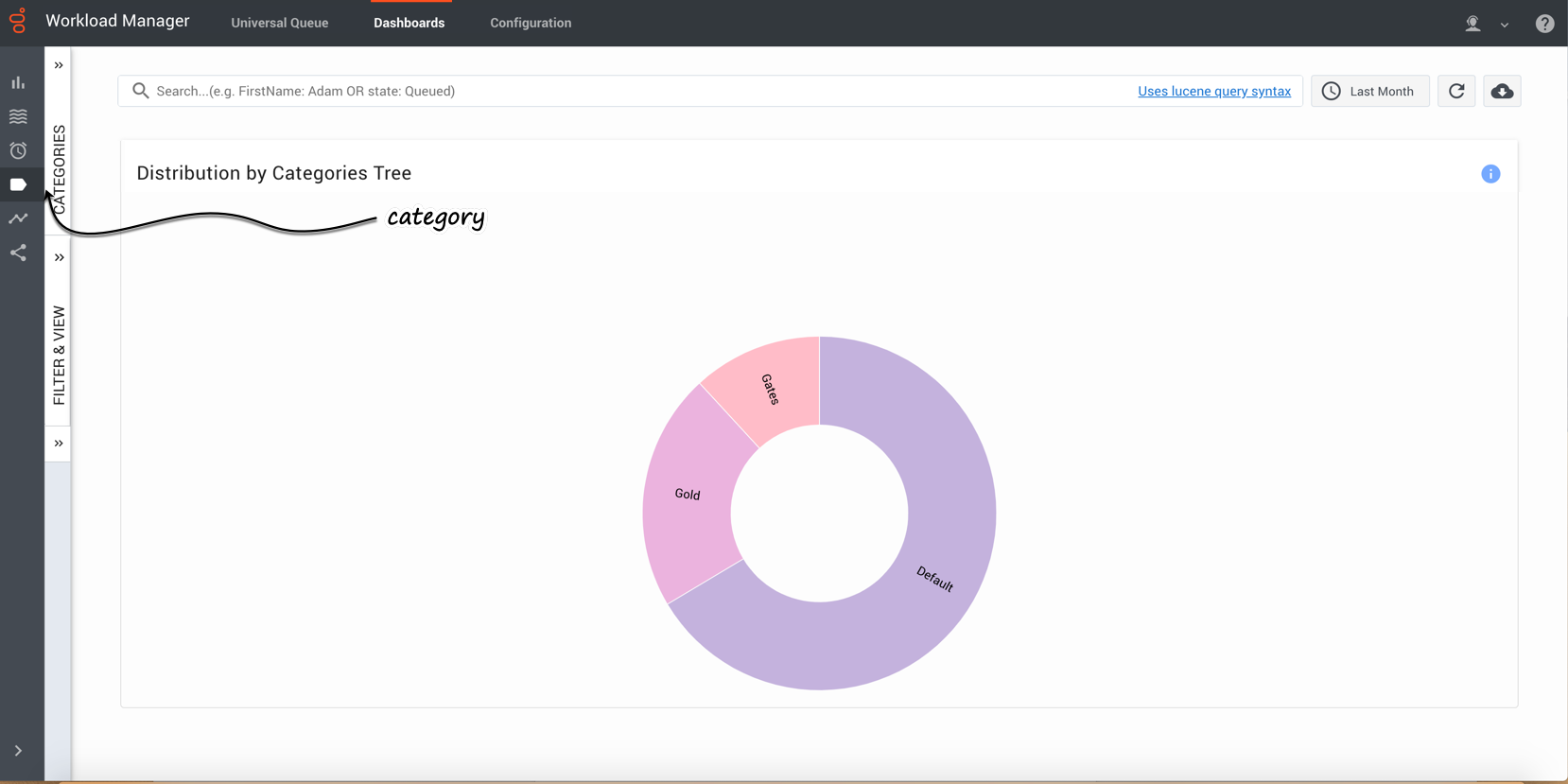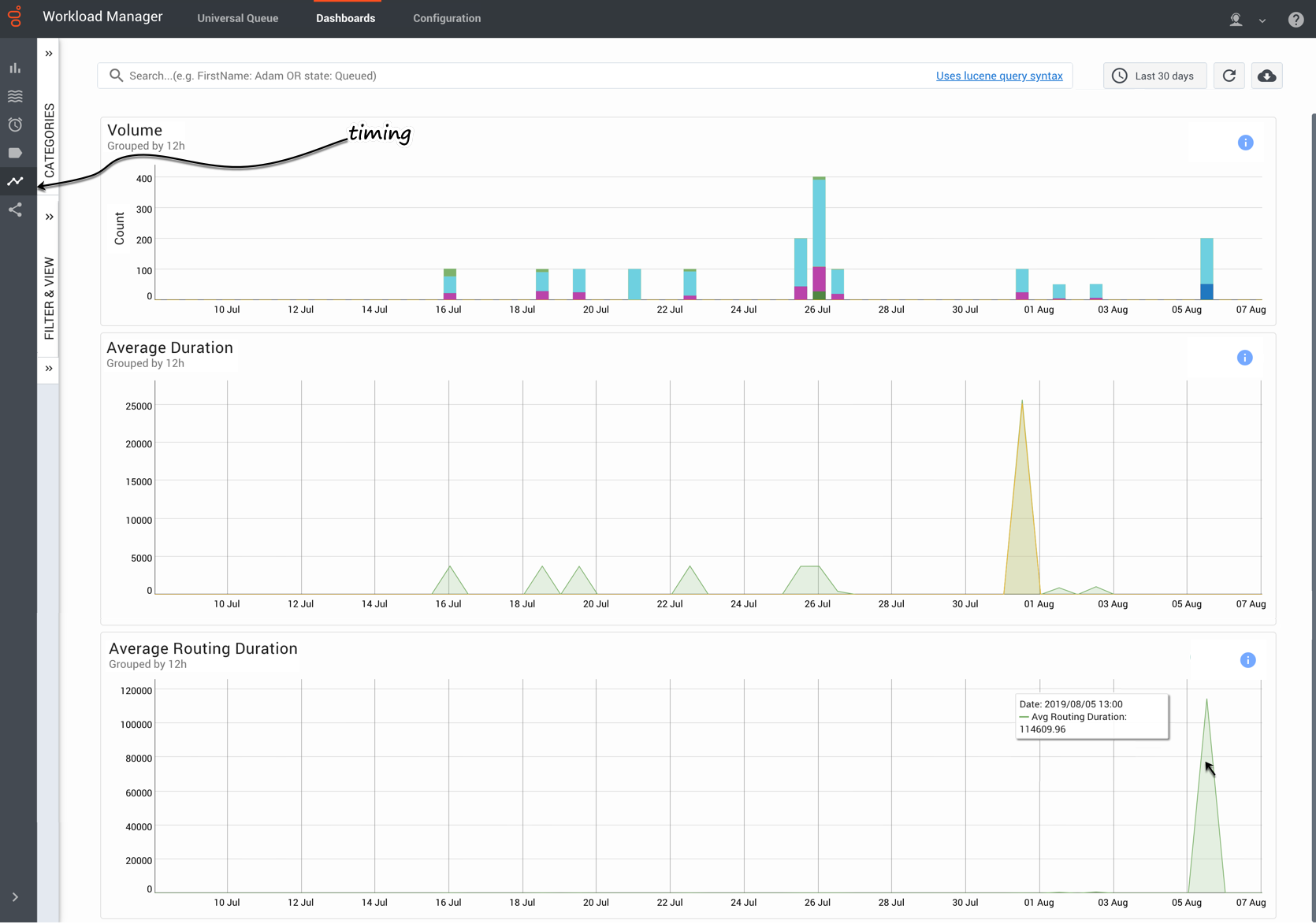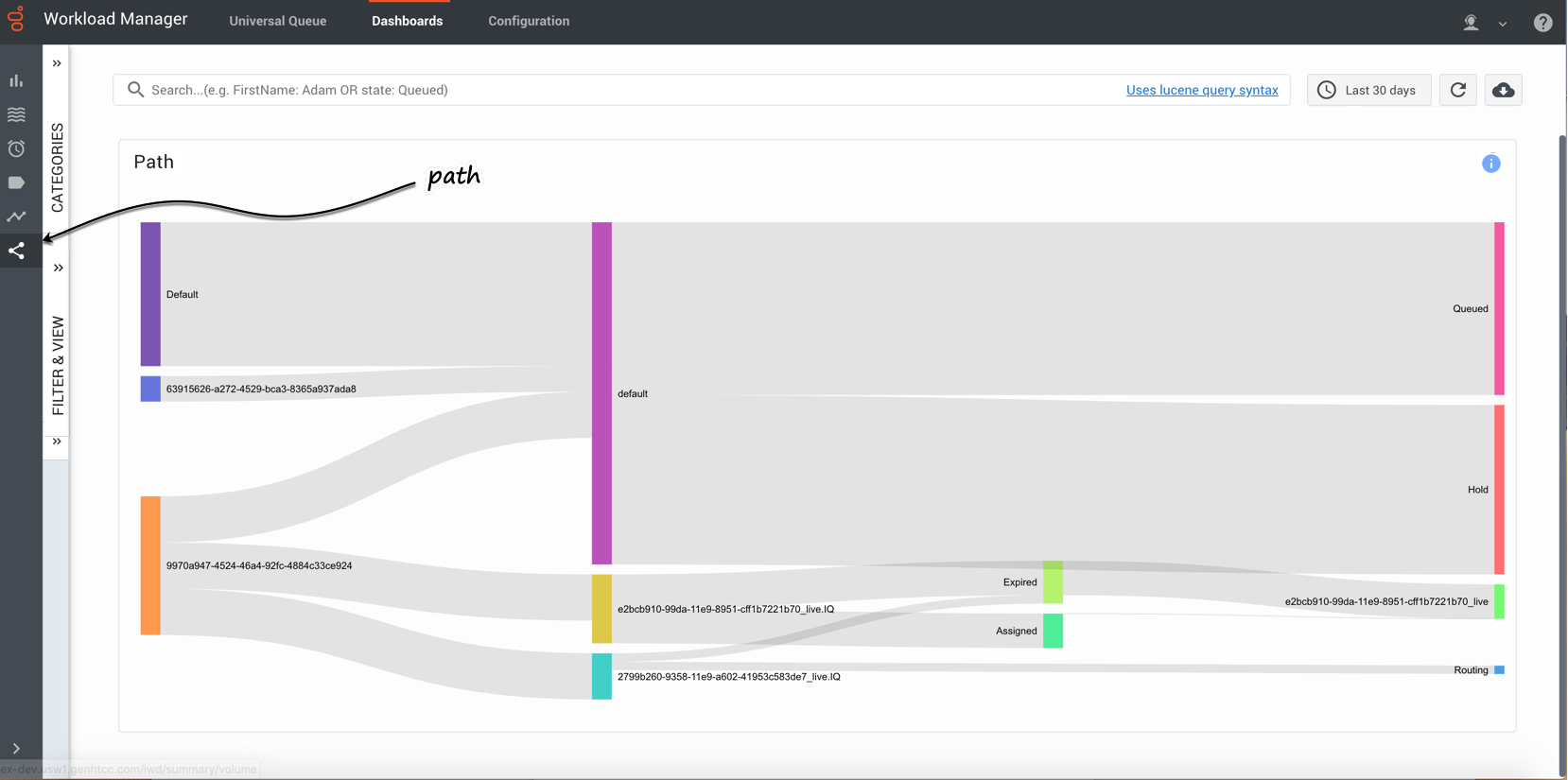Difference between revisions of "PEC-IWD/Current/Administrator/IWDMonitor"
(Published) |
(Published) |
||
| Line 1: | Line 1: | ||
{{Article | {{Article | ||
|Standalone=No | |Standalone=No | ||
| − | |DisplayName=Monitor | + | |DisplayName=Monitor work items |
| − | |TocName=Monitor | + | |TocName=Monitor work items |
| − | |Context=Describes the six different | + | |Context=Describes the six different work item dashboards on the Workload Manager '''Dashboards''' tab. |
|ComingSoon=No | |ComingSoon=No | ||
|Platform=GenesysEngage-cloud | |Platform=GenesysEngage-cloud | ||
|Section={{Section | |Section={{Section | ||
|alignment=Vertical | |alignment=Vertical | ||
| − | |structuredtext=The ''' | + | |structuredtext=The '''Dashboards''' tab in Workload Manager gives you several options for displaying dashboards for monitoring the state of work items controlled by IWD: |
| − | *{{Link-SomewhereInThisManual|topic=IWDMonitor|anchor= | + | *{{Link-SomewhereInThisManual|topic=IWDMonitor|anchor=Bybacklog|display text=By backlog}} |
*{{Link-SomewhereInThisManual|topic=IWDMonitor|anchor=Volume|display text=By volume}} | *{{Link-SomewhereInThisManual|topic=IWDMonitor|anchor=Volume|display text=By volume}} | ||
*{{Link-SomewhereInThisManual|topic=IWDMonitor|anchor=SLA|display text=By Service Level Agreement}} | *{{Link-SomewhereInThisManual|topic=IWDMonitor|anchor=SLA|display text=By Service Level Agreement}} | ||
| Line 19: | Line 19: | ||
{{NoteFormat| | {{NoteFormat| | ||
*All the displays reflect the currently selected time frame, the selected Category and Query. | *All the displays reflect the currently selected time frame, the selected Category and Query. | ||
| − | *Where very large numbers of | + | *Where very large numbers of work items are displayed, scientific notation is used on the axes of display graphs.|}} |
|Status=No | |Status=No | ||
}}{{Section | }}{{Section | ||
| Line 26: | Line 26: | ||
|alignment=Horizontal | |alignment=Horizontal | ||
|Media=Image | |Media=Image | ||
| − | |image= | + | |image=ManagerSummaryBacklog_1.png |
| − | |structuredtext=Provides | + | |structuredtext=Provides a high-level intraday summary of the backlog for the period chosen. This is the starting point for analysis, enabling you to quickly spot trends in KPI and potential bottlenecks in work items. For example, it can quickly show you that the backlog is growing or shrinking. It displays dynamically the overall backlog, the backlog by category, and arrival and completion volumes. |
You can: | You can: | ||
| Line 37: | Line 37: | ||
|structuredtextwide='''Metric descriptions''' | |structuredtextwide='''Metric descriptions''' | ||
| − | *'''Overall backlog'''—The overall amount of | + | *'''Overall backlog'''—The overall amount of work items. |
| − | *'''Backlog by Category'''—The amount of | + | *'''Backlog by Category'''—The amount of work items in distribution by category. |
| − | *'''Arrival and Completion Volumes'''—The amount of arrived and completed | + | *'''Arrival and Completion Volumes'''—The amount of arrived and completed work items in a time range. |
|Status=No | |Status=No | ||
}}{{Section | }}{{Section | ||
| Line 46: | Line 46: | ||
|alignment=Horizontal | |alignment=Horizontal | ||
|Media=Image | |Media=Image | ||
| − | |image= | + | |image=ManagerSummaryVolume_2.png |
|structuredtext=Displays dynamic histogram and summary totals (total, average duration, average time in queue, average time in routing) for the selected time interval and category, and distributions by state (pie chart) and priority ranges (bar chart). | |structuredtext=Displays dynamic histogram and summary totals (total, average duration, average time in queue, average time in routing) for the selected time interval and category, and distributions by state (pie chart) and priority ranges (bar chart). | ||
You can: | You can: | ||
| Line 56: | Line 56: | ||
|structuredtextwide='''Metric descriptions''' | |structuredtextwide='''Metric descriptions''' | ||
| − | *Volume graph—The total number of new | + | *'''Volume graph'''—The total number of new work items that were submitted to IWD in a time range. |
| − | *Total—The total number of new | + | *'''Total'''—The total number of new work items that were submitted to IWD during the reporting interval. |
| − | *Average duration—The average amount of time that elapsed before agents completed | + | *'''Average duration'''—The average amount of time that elapsed before agents completed work items. This metric includes the time that work items were backlogged, as well as work time. |
| − | *Average | + | *'''Average Queued'''—The average amount of time a work item was waiting in the queue. |
| − | *Average | + | *'''Average Routing'''—The average amount of time a work item was waiting to be routed. |
| − | *Distribution by state—The distribution of | + | *'''Distribution by state'''—The distribution of work items by their state, in percent and quantity. |
| − | *Distribution by priority ranges—The number of | + | *'''Distribution by priority ranges'''—The number of work items that have different priorities. |
|Status=No | |Status=No | ||
}}{{Section | }}{{Section | ||
| Line 69: | Line 69: | ||
|alignment=Horizontal | |alignment=Horizontal | ||
|Media=Image | |Media=Image | ||
| − | |image= | + | |image=ManagerSummarySLA_1.png |
| − | |structuredtext=Displays | + | |structuredtext=Displays dynamic work item counts for selected pre-SLA intervals, and for work items that have breached their SLA by selected intervals. You can: |
*Dynamically change the time interval and category for display. | *Dynamically change the time interval and category for display. | ||
| Line 79: | Line 79: | ||
'''Metric descriptions''' | '''Metric descriptions''' | ||
| − | *Pre SLA item counts—The amount of | + | *'''Pre SLA item counts'''—The amount of work items that should be serviced in a selected time range. |
| − | *Breached SLA item—The amount of | + | *'''Breached SLA item'''—The amount of work items that should have been serviced but were not, in a selected time range. |
|Status=No | |Status=No | ||
}}{{Section | }}{{Section | ||
| Line 87: | Line 87: | ||
|alignment=Horizontal | |alignment=Horizontal | ||
|Media=Image | |Media=Image | ||
| − | |image= | + | |image=ManagerSummaryCategory_1.png |
| − | |structuredtext=Displays dynamically the distribution of | + | |structuredtext=Displays dynamically the distribution of work items across the available categories for the date and time selected. You can select current or historical time intervals for a rapid visual comparison. |
You can also dynamically select a predefined query for display. | You can also dynamically select a predefined query for display. | ||
| Line 96: | Line 96: | ||
'''Metric description''' | '''Metric description''' | ||
| − | *Distribution by categories—Distribution of | + | *'''Distribution by categories'''—Distribution of work items by categories. |
|Status=No | |Status=No | ||
}}{{Section | }}{{Section | ||
| Line 103: | Line 103: | ||
|alignment=Horizontal | |alignment=Horizontal | ||
|Media=Image | |Media=Image | ||
| − | |image= | + | |image=ManagerSummaryTiming_1.png |
|structuredtext=Displays dynamically the volume of transactions, plus average duration times and average routing duration times. | |structuredtext=Displays dynamically the volume of transactions, plus average duration times and average routing duration times. | ||
You can: | You can: | ||
| Line 113: | Line 113: | ||
'''Metric description''' | '''Metric description''' | ||
| − | *Volume—Total number of received | + | *'''Volume'''—Total number of received work items in a time frame. |
| − | *Average Duration—Average | + | *'''Average Duration'''—Average work item lifetime and time before work items become queued. |
| − | *Average Routing Duration—Average time that | + | *'''Average Routing Duration'''—Average time that work items spent in routing before being routed to the agent. |
|Status=No | |Status=No | ||
}}{{Section | }}{{Section | ||
| Line 122: | Line 122: | ||
|alignment=Horizontal | |alignment=Horizontal | ||
|Media=Image | |Media=Image | ||
| − | |image= | + | |image=ManagerSummaryPath_1.png |
| − | |structuredtext=The Path dashboard enables users to see where the | + | |structuredtext=The '''Path''' dashboard enables users to see where the work item has been segmented, queued in Designer and matched with an employee, through to completion. This dashboard is also useful for identifying work items that have not been segmented and have been matched through the default path. |
|Status=No | |Status=No | ||
}} | }} | ||
}} | }} | ||
Revision as of 16:50, March 31, 2021
Describes the six different work item dashboards on the Workload Manager Dashboards tab.
The Dashboards tab in Workload Manager gives you several options for displaying dashboards for monitoring the state of work items controlled by IWD:
- All the displays reflect the currently selected time frame, the selected Category and Query.
- Where very large numbers of work items are displayed, scientific notation is used on the axes of display graphs.
By backlog
Provides a high-level intraday summary of the backlog for the period chosen. This is the starting point for analysis, enabling you to quickly spot trends in KPI and potential bottlenecks in work items. For example, it can quickly show you that the backlog is growing or shrinking. It displays dynamically the overall backlog, the backlog by category, and arrival and completion volumes.
You can:
- Dynamically change the time interval and category for display.
- Dynamically select a saved search filter from the Filter & View tab for display.
- Hover over populated areas of the graph to display a detail panel for the date and time selected.
- Use your cursor to drag a box to select a range of columns and drill down to a lower level of detail.
Metric descriptions
- Overall backlog—The overall amount of work items.
- Backlog by Category—The amount of work items in distribution by category.
- Arrival and Completion Volumes—The amount of arrived and completed work items in a time range.
By volume
Displays dynamic histogram and summary totals (total, average duration, average time in queue, average time in routing) for the selected time interval and category, and distributions by state (pie chart) and priority ranges (bar chart). You can:
- Dynamically change the time interval and category for display.
- Dynamically select a saved search filter from the Filter & View tab for display.
- Hover over points in any graph to display a detail panel for the selected data point.
- Use your cursor to drag a box to select a range of columns and drill down to a lower level of detail.
Metric descriptions
- Volume graph—The total number of new work items that were submitted to IWD in a time range.
- Total—The total number of new work items that were submitted to IWD during the reporting interval.
- Average duration—The average amount of time that elapsed before agents completed work items. This metric includes the time that work items were backlogged, as well as work time.
- Average Queued—The average amount of time a work item was waiting in the queue.
- Average Routing—The average amount of time a work item was waiting to be routed.
- Distribution by state—The distribution of work items by their state, in percent and quantity.
- Distribution by priority ranges—The number of work items that have different priorities.
By SLA
Displays dynamic work item counts for selected pre-SLA intervals, and for work items that have breached their SLA by selected intervals. You can:
- Dynamically change the time interval and category for display.
- Dynamically select a saved search filter from the Filter & View tab for display.
- Hover over populated areas of the graph to display a detail panel for the date and time selected.
- Use the sliders at the foot of the panels to change the time ranges.
Metric descriptions
- Pre SLA item counts—The amount of work items that should be serviced in a selected time range.
- Breached SLA item—The amount of work items that should have been serviced but were not, in a selected time range.
By categories
Displays dynamically the distribution of work items across the available categories for the date and time selected. You can select current or historical time intervals for a rapid visual comparison.
You can also dynamically select a predefined query for display.
Hover over a Category chart to display information about that Category.
Metric description
- Distribution by categories—Distribution of work items by categories.
By timing
Displays dynamically the volume of transactions, plus average duration times and average routing duration times. You can:
- Dynamically change the time interval and category for display.
- Dynamically select a saved search filter from the Filter & View tab for display.
- Hover over populated areas of the graph to display a detail panel for the date and time selected.
Metric description
- Volume—Total number of received work items in a time frame.
- Average Duration—Average work item lifetime and time before work items become queued.
- Average Routing Duration—Average time that work items spent in routing before being routed to the agent.

